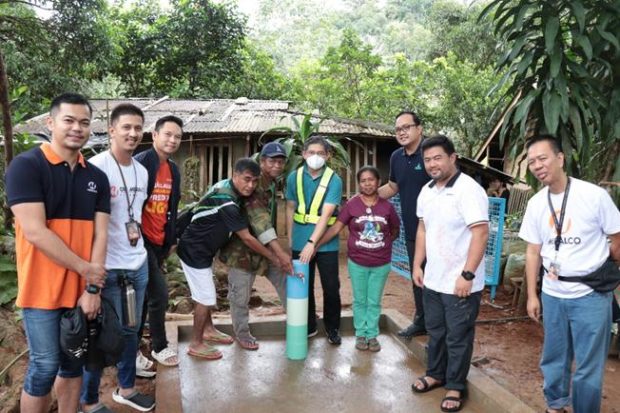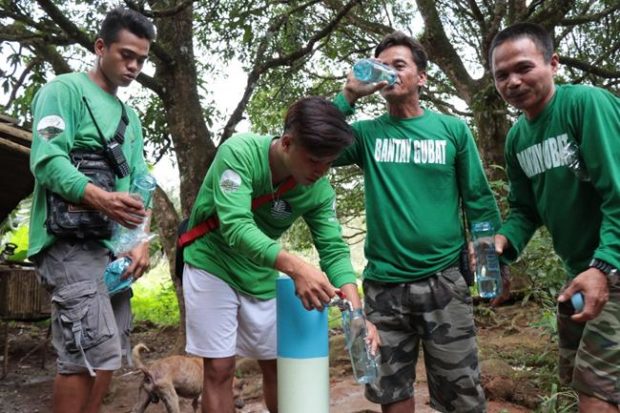Manila Water Foundation and partners open taps for clean, potable water for IP community

Manila Water Foundation, together with its institutional partners, Manila Water Company (MWC), Metropolitan Waterworks and Sewerage System (MWSS), and One Meralco Foundation (OMF), inaugurates a water treatment facility with a chlorinator and sand filter for a Dumagat community in Norzagaray, Bulacan. The water system project, which can cater to the daily water needs of at least 100 families, will be operated and managed by the community of Sitio Sapang Munti. Contributed photo
MANILA, Philippines — What could be a more meaningful gift for communities than access to clean, potable water?
Manila Water Foundation, together with its institutional partners, Manila Water Company (MWC), Metropolitan Waterworks and Sewerage System (MWSS), and One Meralco Foundation (OMF), recently inaugurated a water treatment facility with a chlorinator and sand filter for a Dumagat community.
The facility will produce clean potable water to be stored in the five-water-tank reservoir over a 3-kilometer water line and 17 watering points in Sitio Sapang Munti in Norzagaray, Bulacan.
Agreements were formalized among the water concessionaires, MWSS, and the Department of Environment and Natural Resources (DENR) to collaborate and complement resources for the Ipo Watershed Management Plan, which safeguards its responsible protection, development, management, and conservation.
Manila Water Foundation responds to the call for environmental sustainability within the watershed through the development of a program on WASH or water access, sanitation, and hygiene designed to address the needs of the indigenous peoples in Sitio Sapang Munti.
A series of technical and social assessments were conducted, with the cooperation of the MWSS Watershed Division and the community members, enabling the development of a water access project under the Integrated WASH program of the Manila Water Foundation.
During the water treatment facility handover, Manila Water Foundation Executive Director, Reginald Andal pointed out the importance of having a clean source of water to the community and how it can help protect individuals from having illnesses and diseases. “Isa po sa pinakamahalagang elemento ng ating pamumuhay ay ang ating tubig. Sisiguraduhin nating lagi po tayong may tubig para maligtas sa kahit anong sakit,” he said.
Andal encouraged community stewardship for the facility and its watering points. “Sa amin pong pangalawang punta rito, dinala namin ang aming mga eksperto mula sa Manila Water Company na siyang nag-aral ng water source dito at nag-aral ng tamang disensyo sa ating patubig. Maayos po nating aalagaan ang operations at maintenance ng ating water treatment facility at ang ating watering points,” he stated.

Manila Water Foundation, together with its institutional partners, Manila Water Company (MWC), Metropolitan Waterworks and Sewerage System (MWSS), and One Meralco Foundation (OMF), inaugurates a water treatment facility with a chlorinator and sand filter for a Dumagat community in Norzagaray, Bulacan. The water system project, which can cater to the daily water needs of at least 100 families, will be operated and managed by the community of Sitio Sapang Munti. Contributed photo
The water system project will be operated and managed by the community of Sitio Sapang Munti to ensure a more sustainable, safe, and reliable water source for at least 100 families.
Sitio Sapang Munti resident Maritess Cruz shared the challenges of living in a waterless community. “Hindi po kami marunong maghugas ng kamay nang tama. Basta ganun-ganun lang. Hindi rin po namin alam na ‘yung kinukuhanan namin ng tubig noon ay marumi pala. Sa tagal po ng panahon, pakiramdam ko ngayon lang kami nagising,” she said. Cruz expressed her heartfelt gratitude to Manila Water Foundation and its partners for bringing water access to their community. “Lubos po akong nagpapasalamat sa patubig na ito, pamasko na po ito para samin. Tuwang-tuwa po kami kasi matagal na po naming itong inaasahan,” she added.
This water access project demonstrates synergy across business groups. Along with Manila Water Foundation’s Integrated WASH program, One Meralco Foundation will provide solar panels to energize the water treatment facility. Hence, the water system and solar electricity can enable the proper WASH practices in schools as their existing handwashing facility and toilet are now directly connected to the water line.
With a water treatment facility in the area, communities now have immediate access to safely managed water for daily use to ensure good health and protection from water-borne diseases.
Manila Water Foundation and partners hope that the water treatment and water access infrastructure project for Sitio Sapang Munti demonstrates their commitment to supporting the health and well-being of indigenous peoples through WASH.
RELATED STORY
Manila Water’s distribution network now stretches to 5,362 kilometers